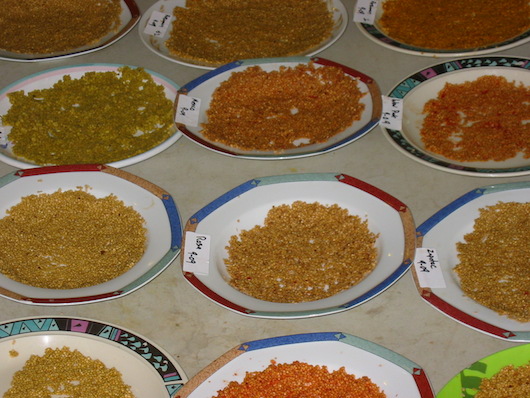With weather in the 70s and blossoms on the trees, it’s spring fever for certain. And with thoughts of spring come thoughts of planting, and seeds. Indeed, such were the thoughts of an enthusiastic group of farmers and gardeners from the Capay Valley and beyond, who gathered at the Western Yolo Grange Hall in Guinda at the end of January for the 2nd Annual Seed, Plant and Scion Swap. It was a chance to bandy and barter all manner of plant matter, from seeds to starts to fruit tree cuttings. Seed and plant exchanges like this one have sprung up across the country in recent years, and represent a hearty interest in community resiliency and local self-sufficiency. Regionally saved seeds can be selected for, and therefore more adapted to, the specific climate and environmental challenges of a locale, and for farmers or gardeners, saving their own seeds expresses independence, knowledge and access. The exchange and preservation of seeds can be organized relatively informally, as a once a year community seed swap (like here in the Capay Valley) or it can take on the more formalized form of a seed library. Across the United States, there are now over 300 seed libraries, all providing low-cost or “free access to seeds, protect[ing] the diversity of our food sources, and educat[ing] community members about growing food and saving seed.” (seedlibrary.net)
Inspirational, right? Perhaps you already use your local seed library or seed swap, or perhaps you now want to start one. But did you know that there’s an important campaign under way to ensure that these models of local and regional seed sharing don’t become unfairly targeted by state department of agriculture laws that were written with commercial seed transactions in mind?
Here’s what happened: Last summer, a seed library in Mechanicsburg, Pennsylvania received a letter from the state’s department of agriculture warning that the non-profit library was in violation of the state’s seed law. Then, later in the fall, the Minnesota DOA cracked down on a seed library in Duluth. These actions have prompted a nationwide effort, led by the Sustainable Economies Law Center in Oakland, calling for revisions to state seed laws.
These laws mostly deal with labeling, germination and noxious weed requirements and their original intent is to protect the consumer, the farmer or gardener. Which makes sense, because if you’re a farmer purchasing a large quantity of seed, you want to make sure that you don’t unknowingly sow a bunch of noxious weed seeds in your fields or sink your hard earned money into seed that has abysmally low germination. In some states, the law clearly only applies to the sale of seeds; however, in other states, the law may be construed to apply to seeds that are bartered, shared or transported – basically, any transaction that involves seed changing hands. To you and me, applying the same laws intended to govern commercial seed transactions to community seed swaps and seed libraries seems unreasonable, and certainly like a giant misapplication – in terms of scale (seed libraries deal in small volumes of seed, not commercial quantities), resources (seed libraries don’t have the staff or the budgets to meet germination testing and labeling requirements), and mission (seed libraries are focused on giving people access to low-cost or free seed and preserving unique varieties, not on profit). But not so to the state DOAs in Pennsylvania and Minnesota – and possibly others.
So what can you do? The Sustainable Economies Law Center has created an online petition. State legislatures in Minnesota, Nebraska, and California will consider bills this session to remove these unnecessary legal barriers to sharing locally grown and saved seeds. You can sign the petition at seedlibraries.net and learn more at www.theselc.org/seed_advocacy_faqs
What else can you do? Save seed. Grow plants. Support your local seed library. Invest in community food resiliency. Sustain your local farmers. And eat your veggies from Full Belly Farm!
–Gwenael Engelskirchen
Full Belly crew

Plates of tomato seeds that Full Belly saves from the previous year’s tomato harvest.
